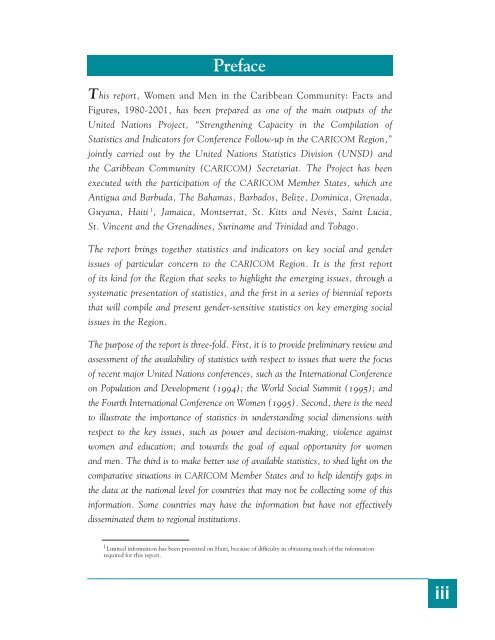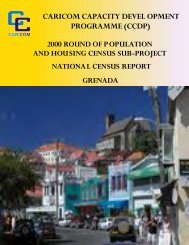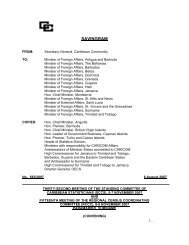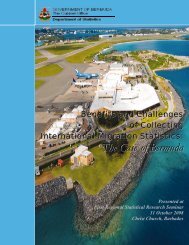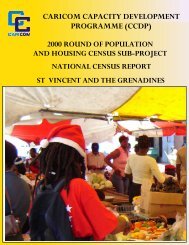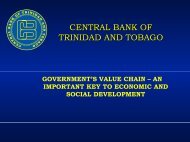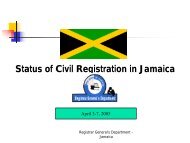Women and Men in the Caribbean Community
Facts and Figures, 1980-2001 - CARICOM Statistics
Facts and Figures, 1980-2001 - CARICOM Statistics
You also want an ePaper? Increase the reach of your titles
YUMPU automatically turns print PDFs into web optimized ePapers that Google loves.
PrefaceThis report, <strong>Women</strong> <strong>and</strong> <strong>Men</strong> <strong>in</strong> <strong>the</strong> <strong>Caribbean</strong> <strong>Community</strong>: Facts <strong>and</strong>Figures, 1980-2001, has been prepared as one of <strong>the</strong> ma<strong>in</strong> outputs of <strong>the</strong>United Nations Project, “Streng<strong>the</strong>n<strong>in</strong>g Capacity <strong>in</strong> <strong>the</strong> Compilation ofStatistics <strong>and</strong> Indicators for Conference Follow-up <strong>in</strong> <strong>the</strong> CARICOM Region,”jo<strong>in</strong>tly carried out by <strong>the</strong> United Nations Statistics Division (UNSD) <strong>and</strong><strong>the</strong> <strong>Caribbean</strong> <strong>Community</strong> (CARICOM) Secretariat. The Project has beenexecuted with <strong>the</strong> participation of <strong>the</strong> CARICOM Member States, which areAntigua <strong>and</strong> Barbuda, The Bahamas, Barbados, Belize, Dom<strong>in</strong>ica, Grenada,Guyana, Haiti 1 , Jamaica, Montserrat, St. Kitts <strong>and</strong> Nevis, Sa<strong>in</strong>t Lucia,St. V<strong>in</strong>cent <strong>and</strong> <strong>the</strong> Grenad<strong>in</strong>es, Sur<strong>in</strong>ame <strong>and</strong> Tr<strong>in</strong>idad <strong>and</strong> Tobago.The report br<strong>in</strong>gs toge<strong>the</strong>r statistics <strong>and</strong> <strong>in</strong>dicators on key social <strong>and</strong> genderissues of particular concern to <strong>the</strong> CARICOM Region. It is <strong>the</strong> first reportof its k<strong>in</strong>d for <strong>the</strong> Region that seeks to highlight <strong>the</strong> emerg<strong>in</strong>g issues, through asystematic presentation of statistics, <strong>and</strong> <strong>the</strong> first <strong>in</strong> a series of biennial reportsthat will compile <strong>and</strong> present gender-sensitive statistics on key emerg<strong>in</strong>g socialissues <strong>in</strong> <strong>the</strong> Region.The purpose of <strong>the</strong> report is three-fold. First, it is to provide prelim<strong>in</strong>ary review <strong>and</strong>assessment of <strong>the</strong> availability of statistics with respect to issues that were <strong>the</strong> focusof recent major United Nations conferences, such as <strong>the</strong> International Conferenceon Population <strong>and</strong> Development (1994); <strong>the</strong> World Social Summit (1995); <strong>and</strong><strong>the</strong> Fourth International Conference on <strong>Women</strong> (1995). Second, <strong>the</strong>re is <strong>the</strong> needto illustrate <strong>the</strong> importance of statistics <strong>in</strong> underst<strong>and</strong><strong>in</strong>g social dimensions withrespect to <strong>the</strong> key issues, such as power <strong>and</strong> decision-mak<strong>in</strong>g, violence aga<strong>in</strong>stwomen <strong>and</strong> education; <strong>and</strong> towards <strong>the</strong> goal of equal opportunity for women<strong>and</strong> men. The third is to make better use of available statistics, to shed light on <strong>the</strong>comparative situations <strong>in</strong> CARICOM Member States <strong>and</strong> to help identify gaps <strong>in</strong><strong>the</strong> data at <strong>the</strong> national level for countries that may not be collect<strong>in</strong>g some of this<strong>in</strong>formation. Some countries may have <strong>the</strong> <strong>in</strong>formation but have not effectivelydissem<strong>in</strong>ated <strong>the</strong>m to regional <strong>in</strong>stitutions.1 Limited <strong>in</strong>formation has been presented on Haiti, because of difficulty <strong>in</strong> obta<strong>in</strong><strong>in</strong>g much of <strong>the</strong> <strong>in</strong>formationrequired for this report.iii


